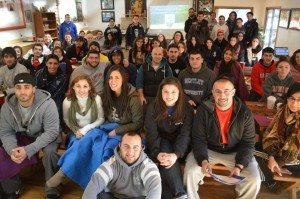By Dan Chakmakjian
Following last year’s theme of “Armenia’s Vidjag” (or “Armenia’s condition”), the AYF Central Educational Council chose to push this year’s AYF-YOARF Senior Seminar in a new direction titled, “Project Armenia.” This theme allowed AYF Seniors to learn ways to use the knowledge they gained from the previous Seminar, and presented new issues as well. The Seminar tied in very well with the AYF’s project focus in 2012.

The event, held at Camp Haiastan in Franklin, Mass., from Oct. 12-14, brought together 70 AYFers from the Eastern Region to learn and build friendships. Friday night began with a bonfire as members arrived from all regions. The next morning began with raising the flags and breakfast.
The first lecture was given by AYF Central Executive members Sossé Beugekian and Raffi Hovagimian about the “Tebi Javakhk” (“Towards Javakhk”) initiative that was a project of the Eastern Region this year. “Tebi Javakhk” brought a group of AYFers to Javakhk, where they facilitated a two-week summer camp for children in Akhalkalak and Akhaltsikhe. Despite some problems at the border, they were able to facilitate a successful and fulfilling two weeks and came back with many good stories.
Nancy Agabian then gave a lecture about minority rights in Armenia, specifically focusing on the events of the DIY bombing and the response to it in both the diaspora and Armenia. She gave an overview of Armenian LGBT activist groups in the diaspora and Armenia. She then related these issues to the overall condition of minority rights in Armenia and provided options for getting involved in these activist groups.
After a break for lunch the group, reconvened for a lecture from Nieri Avanessian, a fellow member of the AYF who had gone to Armenia through “Birthright Armenia” and worked for the Civilitas Foundation as a journalist. She shared her experience reporting activist issues in Armenia, specifically environmental issues such as the Teghut forest and the Trchkan waterfall. She explained the short- and long-term impacts of government projects that would affect these areas if they were completed, and the grassroots activism campaign that has been opposing them. She admitted she did not know much about journalism prior to going to Armenia, and learned greatly from her experience.
Finally, Antranig Kasbarian gave a lecture on the history and current condition of Nagorno-Karabagh (Artsakh) and its “ongoing quest for self-determination.” He explained to the audience the differences between the political argument based on international laws and the argument regarding historical ownership of the land; this showed members how to use the same argument in defense of the issue. He also gave his opinion on what the future could hold and how the pardoning of Ramil Safarov could affect this.
After the lectures, ARFer Zohrab Khaligian of Racine, Wisc., led a discussion about the issues presented in the lectures and his challenge from the previous year: In 2011, Khaligian challenged the chapters to identify the roles members in their chapters play and find a way to use these roles to improve communication and participation in the community. There were a range of reactions to each of the issues, and each component of the discussion related back to increasing participation and communication. Each chapter also reported how they had attempted to meet the challenge of the prior year, and their results.
After a long day the discussion concluded and members came together for a delicious kebab dinner and a second bonfire. Due to the extreme chill of the previous night, many members decided to retire to the warmth of the mess hall.
The next day, as members left, there were many long goodbyes and hugs. An exhausting but fulfilling weekend had come to an end and all participants knew that they would miss one another until the next event.
Each member left with a shirt bearing the quote: “Never doubt that a small group of thoughtful, committed citizens can change the world. Indeed, it is the only thing that ever has.” — Margaret Mead.
Dan Chakmakjian is a member of the Greater Boston ‘Nejdeh’ Chapter and a student at Northeastern University.


One option to help is to participate on a Fuller Center for Housing mission build trip to Armenia. The program has proven to be 100% effective in stopping migration. Check it out…
http://www.fullercenter.org/global-builders/armenia